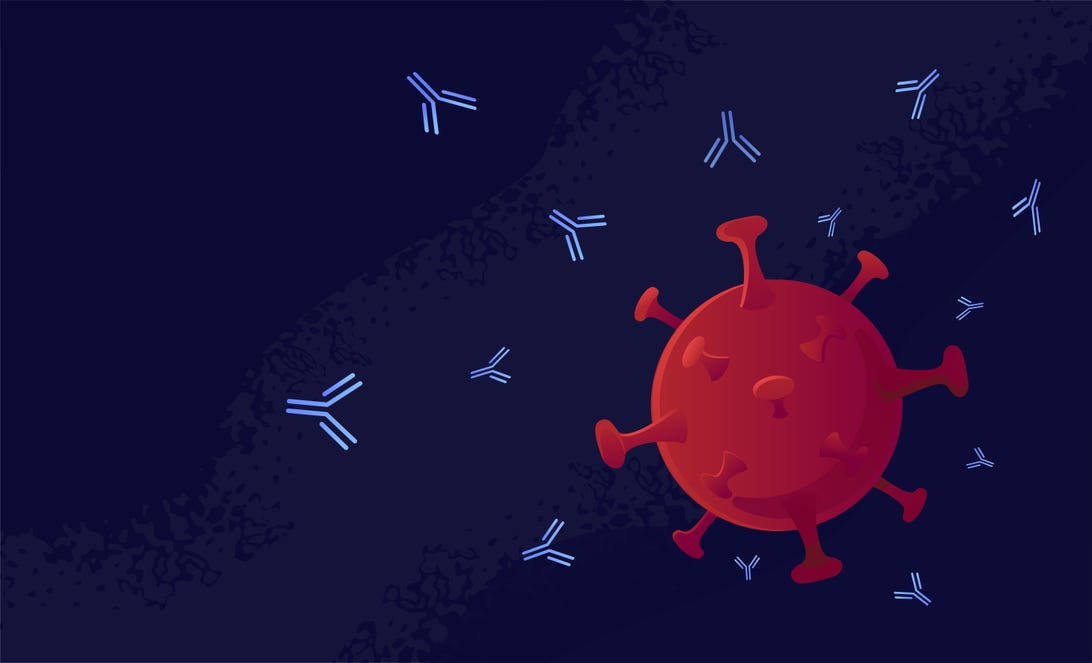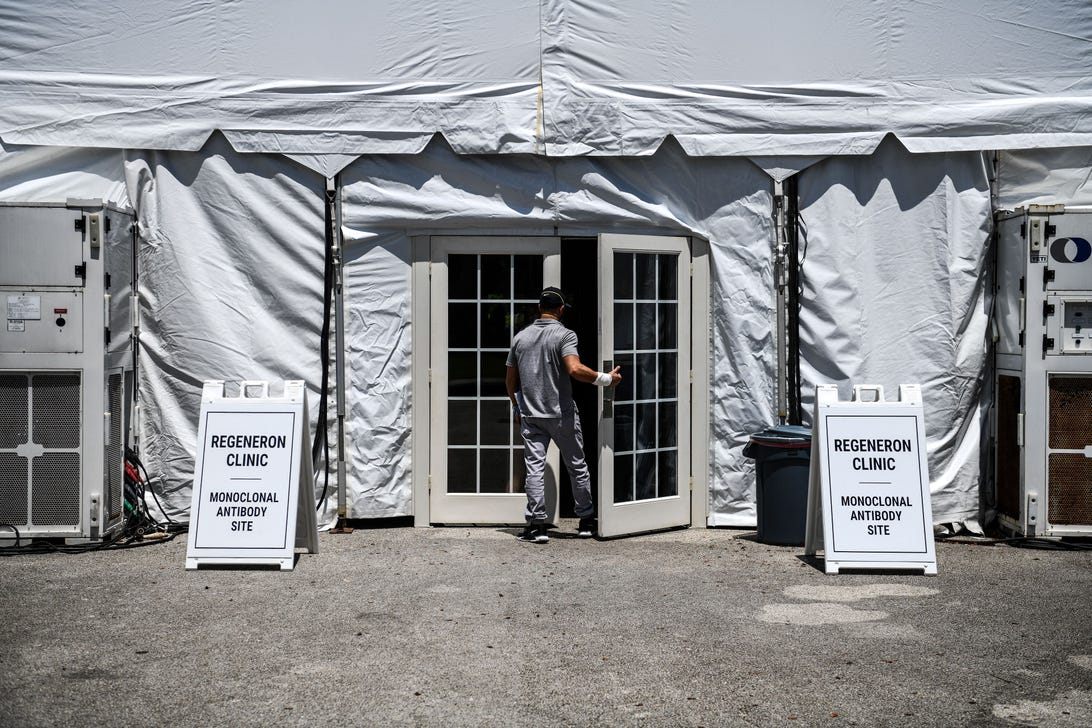
On Friday, the US Food and Drug Administration authorized a new monoclonal antibody therapy that appears to work against the omicron variant of COVID-19.
Bebtelovimab, made by Eli Lilly, is authorized for use in patients 12 and up who have mild or moderate COVID-19 and are at high risk for severe disease. The antibody should be used when other treatments for high-risk patients are either unavailable or inappropriate, and given within the first seven days of COVID-19 symptoms, the FDA said.
"Today's action makes available another monoclonal antibody that shows activity against omicron, at a time when we are seeking to further increase supply," Dr. Patrizia Cavazzoni, director of the FDA's Center for Drug Evaluation and Research, said in a statement. "This authorization is an important step in meeting the need for more tools to treat patients as new variants of the virus continue to emerge."
The day before the FDA authorized the new antibody, the US Department of Health and Human Services announced that the federal government had purchased 600,000 courses of the treatment and will be shipping them out to states — half of the doses this month and the other half in March.
In January, the FDA pulled back emergency use authorization of an earlier monoclonal antibody treatment made by Eli Lilly and also one from Regeneron (REGEN-COV) because they no longer worked to prevent severe disease caused by the omicron variant. But in the future, the FDA noted, these two treatments may be used when it's likely someone was infected with or exposed to a variant that the drugs are effective against.
Another monoclonal antibody therapy made by GlaxoSmithKline and its partner Vir Biotechnology -- called sotrovimab -- remains effective against omicron and maintains emergency use authorization. Other treatments expected to work against omicron and which are still available for at-risk patients include Paxlovid, molnupiravir and remdesivir. In January, the FDA expanded use of remdesivir for treating at-risk patients in the early days of their illness, including in children under 12. Previously, it was only authorized for people hospitalized with COVID-19.

A monoclonal antibody treatment center in Pembroke Pines, Florida.
Chandan Khanna/GettyWhat are monoclonal antibodies, and how do they work?
Monoclonal antibodies are lab-made antibodies that work by binding to bacteria, cancer cells or viruses the way natural antibodies do, stopping them from infecting more cells. The first monoclonal antibody therapy was approved more than 30 years ago and has been used for other diseases, including cancer.
Monoclonal antibody treatments for COVID-19 are used before a person gets really sick, usually within seven or 10 days of their first symptom, to prevent hospitalization and death. The antibodies aren't used in someone who is already hospitalized and being treated with supplemental oxygen, for example.
One monoclonal antibody therapy made by AstraZeneca (Evusheld) is authorized for preventive use, before a person is sick or exposed, but only for people who are immunocompromised or those who don't mount an adequate immune response to the COVID-19 vaccines.
Who's eligible?
The monoclonal antibody made by GlaxoSmithKline and Vir Biotechnology (sotrovimab) is authorized for people 12 and up who are at risk of getting severely sick from COVID-19 within 10 days of their symptoms starting. People eligible include adults age 65 and up and people living with diabetes, asthma or other medical conditions. The antibody treatment is given through an IV or infusion.
The recently authorized antibody is also for high-risk patients 12 and older with mild or moderate disease, but treatment must be given within seven days of the first symptom. If the person has a positive COVID-19 test but didn't develop symptoms, they don't meet the criteria of "mild or moderate" disease, according to a fact sheet. It'll also be administered if other treatments are either inaccessible or inappropriate for the patient, the FDA said. The New York Times reported this is likely because while data shows the antibody is effective against omicron, the drug hasn't been tested in a study that definitively shows it prevents severe disease.
Why did the FDA stop the use of some monoclonal antibodies?
The virus that causes COVID-19 has mutated over time, and the newest variant causing a wave of infections, omicron, has reduced the effectiveness of some COVID-19 treatments, including the monoclonal antibodies made by Eli Lilly and Regeneron. This is because the antibody treatments are lab-made proteins that mimic the immune system's ability to fight off viruses, the FDA said Monday, which aren't a good match against omicron.
In a statement, Regeneron said it will "continue to progress" other antibody treatments that are active against omicron, and that the company is "working urgently and collaboratively with the FDA to determine how to bring additional safe and effective monoclonal antibody treatments to patients as quickly as possible." The company acknowledged before omicron was dominant in the US that its authorized treatment has "diminished potency."
In a letter from Eli Lilly, the company said that "it is not medically appropriate, at this time, to treat patients with mild to moderate COVID-19 with bamlanivimab and etesevimab together in the US." The FDA is reviewing a submission from the company for another antibody therapy that might work against all variants of concern, including omicron, the company said.
How do I get treatment? Is it free?
In January, it was announced that the US government would purchase an additional 600,000 doses of sotrovimab, up from its November agreement. This means the drug itself is free, but you may have to pay the administration fee depending on your insurance.
The government has also purchased 600,000 courses of the recently-authorized bebtelovimab, meaning the drug itself will be free. It will be given through an IV by a health professional.
To find treatment near you, you can call the Combat COVID Monoclonal Antibodies Call Center at 1-877-332-6585 or your primary care doctor.
In January, Florida's state health department announced it was closing the state's monoclonal antibody treatment sites until further notice. In early January, Florida Gov. Ron DeSantis announced that the state had received additional doses of Regeneron's drug.
Do monoclonal antibodies interfere with the coronavirus vaccines?
If you were treated with monoclonal antibodies and you haven't been vaccinated yet, you should wait 90 days after your treatment to get the shot, according to the CDC. This recommendation is until more is known about how the antibody response from the treatment affects the immune response from getting vaccinated.
Everyone age 5 and up is eligible for a COVID-19 vaccine in the US.
The information contained in this article is for educational and informational purposes only and is not intended as health or medical advice. Always consult a physician or other qualified health provider regarding any questions you may have about a medical condition or health objectives.
Article From & Read More ( Monoclonal antibodies: FDA authorizes new treatment - CNET )https://ift.tt/Hm471ev
Business
Bagikan Berita Ini














0 Response to "Monoclonal antibodies: FDA authorizes new treatment - CNET"
Post a Comment